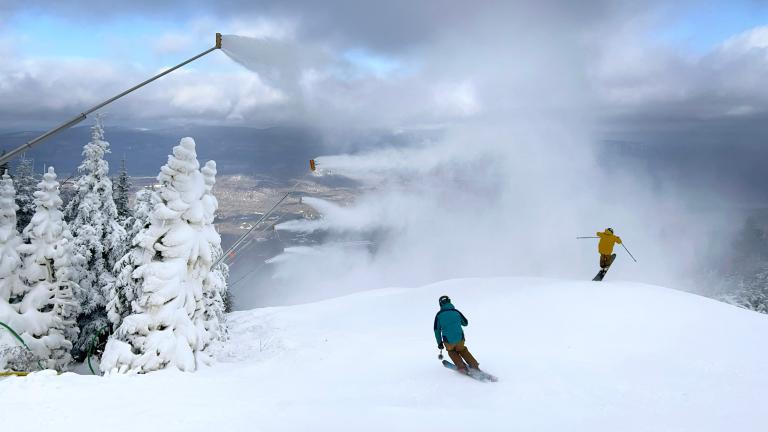Gaping budget deficits. Record foreclosures. High unemployment. Surely, this would be the perfect time to choose jobs over the environment.
That’s what two Texas oil companies figured when they put Proposition 23 on the California ballot in November. The measure would have “suspended” California’s Global Warming Solutions Act until unemployment fell below 5.5 percent. California voters rejected it overwhelmingly.
Do you think Californians, with 12.4 percent unemployment, were saying, “We want climate solutions, not jobs”? Of course not. They were saying something much more positive: “Climate solutions ARE jobs, and we’ll have both.”
The West Coast clean energy economy is a bright spot on the economic horizon. Renewable energy is a huge job driver. Energy efficiency programs are putting people to work in their communities, while keeping energy dollars circulating through their local economies. Cleaner cars and better transportation choices are reducing our crippling dependence on oil.
California’s business community — from Silicon Valley to small town Chambers of Commerce — united to protect the clean energy job engine against the oil interests who see reduced fossil fuel dependence as a threat to their profits. Oil companies tried to sing the tired old “jobs vs. environment” song, but they were way off key.
Now, the global coal industry wants to play that same obsolete, self-serving noise here in the Northwest. They aim to use Northwest ports to ship mountains of coal from Wyoming and Montana to China.
The first of these proposals — Australian coal giant Ambre Energy’s bid for a coal port on the Columbia River — would ship nearly 6 million tons of coal annually. That’s enough to put a 1700-pound lump in the stocking of every Washingtonian, every Christmas. Ultimately, coal companies aim to ship 10-20 times that much from Northwest ports.
Proponents say we need the 20 additional jobs this proposal would create. But it’s hard to imagine a weaker jobs strategy. What kind of economic future awaits us if we become an energy resource colony for Asia? Can you imagine standing at the mouth of the Columbia River, watching ships sail in from Asia carrying solar panels and electric car batteries and plasma TVs, passing ships from America carrying coal? Who’s getting the jobs if China does the manufacturing and innovating and investing while we shovel their coal? Is this really the best we can do?
As bad as this deal is for America’s economy, it’s a flat-out catastrophe for our only planet. It’s considered risky for climate advocates to use scary words like “catastrophe.” But the only thing riskier and scarier is failing to say it when it’s true. (Remember what actually happens in The Boy Who Cried Wolf: The wolf eats the sheep, while the villagers congratulate themselves for not being fooled.)
If we burn the rest of the world’s coal (without technology to safely, economically, and permanently dispose of carbon dioxide — technology that doesn’t exist) we’re toast: we will leave our kids a future of, yes, catastrophic climate disruption. This is not an “environmental” thing; it’s not a political thing; it’s not cable news ideological football. It’s a science thing, a reality thing, a moral crossroads — an epic human tragedy that we are well on our way to creating. Opening a mainline from one of the world’s biggest coal deposits to the world’s biggest market would put our fingerprints all over that tragedy. We just shouldn’t do it.
Here’s the ultimate irony: King Coal wants to make the Northwest the transfer station for the Global Warming Express in part because we’re starting to reduce our own coal consumption. West coast states are committed to reducing dependence on fossil fuels — improving efficiency, developing renewable resources, providing transportation choices, and beginning the transition to a clean energy future. We’re deploying information and communication technology to make energy systems smarter and more efficient. With our abundant hydro resources and these new clean energy initiatives, Washington and Oregon could be coal-free within a few years. Washington Gov. Christine Gregoire said recently, “I’d like us to get out of the coal business.”
That’s great for the Northwest, great for the planet, but bad for King Coal. Their domestic market is shrinking as we develop better ways to meet our energy needs and build healthier economies. So they’re saying, “OK, mind if we just use your railroads and rivers and ports to ship our stuff to Asia?”
What happens to our clean energy economy if we go there? Will we keep installing efficient lights and wind turbines while miles of coal trains chug by, carrying the coal we don’t burn to China so they can use it to make things we don’t make anymore and bake the planet anyway? And if the Pacific Northwest trashes its clean energy credentials, where do we expect leadership to come from? Is there any place on Earth that could do more to pioneer a livable future? Could we even hear the sound of that story over the racket of coal trains screeching by?
The Northwest needs a coal export hub about as much as California needed Proposition 23. We can build a clean energy economy that produces far more and better jobs than King Coal offers. And let’s be clear: there’s no good future — for business, people, or the planet — if we keep stoking the climate crisis with more coal.
If we fall for the old “jobs vs. environment” story, we will lose both. We have begun to show that a new, sustainable prosperity is possible. We know it’s necessary. Would we really sell that last, bright hope down the river for a big lump of coal?




